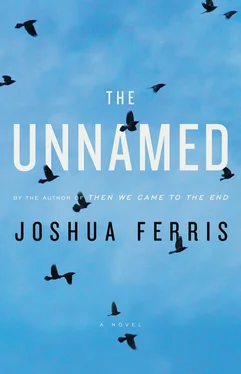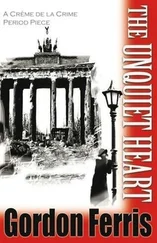He left soon after. Tim realized that Jane’s supposed cancer in no way explained why he should be carrying a backpack around the halls of the firm. Kronish, with his shrewd legal mind, should have seized on that. Maybe he had by now. The strands of his story were easy to take apart. But for the moment, Kronish had only heard the word cancer . Everything else went out the window. That was the power, the enviable, unlucky power, of a fatal and familiar disease.
Overcast was riveted to the sky as gray to a battleship. The footpath of the Brooklyn Bridge matched the color of the day, as did its intricate spiderwebbing metalwork. He went up the incline and under the first arch. The East River was scalloped white from the wind as it coursed south into the harbor. Believing he was alone, to vent his anger he cried out into the consuming gust, only to turn the corner of the arch and find two bundled lovers taking self-portraits. Startled, they backed up against the brickwork to give him a wide berth.
The path flattened out between the first arch and the second. He became aware then of someone keeping pace with him. He thought nothing of it until the man looked over and said, “Aren’t you the attorney defending R. H. Hobbs?”
He turned. Where had the man come from? He looked behind him. The picture-takers were gone.
“Excuse me?” he said.
“Am I right? You’re the man defending R. H. Hobbs.”
That someone would address him out of the blue halfway across the pedestrian walkway of the Brooklyn Bridge was surprising. That that same someone identified him as R.H.’s attorney was alarming. The murder had been mentioned in the papers once or twice, but nothing since the early days. The case lacked a celebrity pedigree, and Tim felt sure that no one outside the legal world would have recognized the lawyers involved.
“Do I know you?”
“Oh, I doubt that,” said the man.
He was about Tim’s height, of a slim build under the winter layers. He was dressed in a camel-hair coat with collar raised. Out of it blossomed the black folds of a cashmere scarf covering his neck. An enormous sable hat was perched on top of his head. The fur quivered in the wind like a patch of black wheat. He had a long pale solitary face, too pale to grow whiskers, bloodless in the cheeks even on so cold a day, with a dimple in his potbellied chin and a long pinched nose that accentuated the bone in the middle, as prominent as a knuckle.
“How do you know me?”
“I followed you from midtown,” said the man. “You work in midtown?”
“That doesn’t answer my question,” he said. And then: “You followed me all the way from midtown to the Brooklyn Bridge?”
“It’s a beautiful day for a walk.”
“No, it’s not,” he said. “It’s well below freezing. What are you doing following me?”
The man continued to keep pace a little too close for comfort. “That was one vicious murder,” he said. “Stabbed his wife like she was a piece of art. Almost beautiful, looked at in a certain light. But monstrous for sure. How can you defend a man like that?”
“Who are you? I’ll call the police.”
“Have you seen the crime-scene photos? Very premeditated cuts. He didn’t just pound away, not after the first couple of stabs. He is one sick bastard, your client.”
“I will call the police.”
But he hadn’t even taken out his phone. He was afraid the man might swipe at his hand. He didn’t want to lose the new BlackBerry as he had lost the old one. He would need it to call Jane when the walk ended.
“And why Staten Island?” asked the man. “Why dump her body in that old Staten Island landfill that’s been closed forever?”
“Who are you?”
“Your client lives in Rye. Why go all the way to Staten Island?”
“How do you know what you know?”
“Want to know what I know?” the man asked. “What I really know?”
The man came to an abrupt halt. Tim was forced to keep moving. They were quickly separated by a number of paces. He turned his head and watched the man recede. The man looked surprised that Tim would continue walking.
“Don’t care to know?” said the man.
“What do you know?” Tim hollered.
“Your client’s innocent, Mr. Farnsworth,” he cried above the wind. “R. H. Hobbs is an innocent man.”
The man removed a Ziploc bag from his coat. Inside the clear bag sat a butcher’s knife. The man held the bag up by the seam and gently shook the knife inside the bag. Then he turned and walked away.
The cemetery had been retired under a white sheet. Darkness now settled over it like dust. A black Mercedes threaded its way through the maze of winding streets.
Jane followed the Mercedes in her car. She pulled up to the curb and stepped out. She hurried through the snow.
He was lying on a cleared bed of granite. He sat up at her touch with a mortal start, as if she had jolted him out of another dimension. His eyes darted wildly in the holes of his ski mask. His unsheltered sleep had put him again at the mercy of an unknown world. He felt the approach of some violent reckoning.
“There was a man on the bridge,” he said.
“What man?”
“He knew who I was.”
His attention was drawn away by the slamming of a car door. He watched a man in a long charcoal wool coat approach them slowly through the crusted snow. Even from so far a distance he could make out those familiar Picasso features — the skewed nose, the plump lips, one eye bigger than the other.
“What is he doing here?”
She was also watching the man come forward. “I called him.”
“I said no doctors.”
“I know,” she said.
“He can’t help me, Jane.”
“How do you know that?”
“None of them can help me.”
“Hello, Tim,” said Dr. Bagdasarian.
They sat in the doctor’s warm Mercedes as halos of glowing halogen began to shine from the lampposts across the cemetery. Tim disliked Bagdasarian the least of all his doctors. He had been the recipient of many funny looks over the years, but Dr. Bagdasarian’s was due to the fact that he was born that way, not because he questioned Tim’s sanity or doubted the severity of his suffering. One look at Bagdasarian and the assumption was that God had deprived him of all beauty and vanity so that he could better dedicate himself to the puzzle of men’s afflictions. The doctor was learned and eloquent with his singsong accent and carried the aura of a polymath.
Yet Tim was not pleased to see him. Before he got sick, he was under the illusion that he needed only to seek help from the medical community, and then all that American ingenuity, all that researched enlightenment, would bring about his inalienable right to good health. At the very least, he thought, there would be one person, one expert in the field, to give him some degree of understanding, solace and action. But by now he had abandoned his search for the One Guy. The One Guy was dead, the One Guy was God, the One Guy was an invention in the night when he was bottomed out and desperate to believe in something. He was sick of searching for the One Guy and sick of having his hopes dashed. He would not let himself believe in the One Guy anymore.
And anyway, who the fuck needed the One Guy? He was still alive, wasn’t he? He could beat this thing on his own, couldn’t he? Fuck the One Guy. Fuck the One Guy’s answers and the One Guy’s hope.
Bagdasarian spoke over their heads for twenty minutes about advances in brain imaging technology. He discussed radioisotopes and motion degradation and atomic magnetometers. Considerable progress had been made, he said, since Tim’s last extended medical examination. In fact there were some very cutting-edge developments that allowed a clean image of the brain to be taken in situ .
Читать дальше












